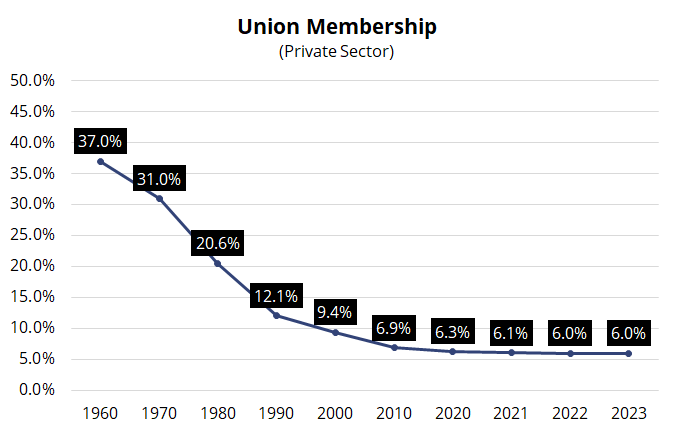

To understand our position on unions, it is helpful to understand not only what a union is, but what a union is not. Unions are not clubs or social organizations.
A union is a business.
Unions represent their members in dealings with employers. In return, unions charge fees for their services. These fees are often deducted directly from employee paychecks.
Today, just 6% of workers in the private sector belong to a union. Like any business, unions need a revenue stream to stay in business. This revenue comes from dues paying members. Unions need new members to survive.

Source: www.bls.gov
The main source of money for unions comes from dues, fees and assessments paid by their members. SYGMA is an attractive target for unions because of our large workforce and growth throughout the country. The more members that unions have, the more membership fees and dues they can collect. They have a vested interest in you signing up to be a member.
- Collect dues, fees, fines and assessments
- Negotiate and make proposals
- Refuse to act on an employee's grievance
- Represent all employees even those who voted against the union
- Require members to go on strike
- Discipline, issue penalties or fine members who violate union by-laws
- Guarantee a union contract
- Guarantee higher wages
- Guarantee better benefits
- Guarantee hours
- Guarantee employment
- Prevent layoffs
- Prevent termination for just cause
- Set job standards
- Fire or transfer managers
Union organizers can and will promise you anything to get you to vote for the Union. However, what you're unlikely to hear from them is the downside of union organization, how it directly impacts you and our company.
Union representation has a hefty price tag. Here are a few examples of the financial obligations you may encounter with membership:
Union dues; (click here to calculate your union dues)
Initiation fees;
Reinstatement fees;
Union assessments; and
Union fines
Union contracts typically contain lots of work rules that tie a company's hands in dealing with its colleagues. For example, our ability to provide flexible schedules and help our people achieve a work-life balance could be severely affected by typical seniority provisions found in union contracts, which are based on how long you've worked for the company, and nothing else. We don't think that's a fair system for anyone. We think treating our people as individuals (and not as numbers) is better.
Under most union contracts, promotions and raises are also done strictly on the basis of seniority. Merit is not a consideration. So, our hardest working colleagues may not be eligible for advancement if someone with more seniority wants the same job. We prefer a system like we have now, where colleagues who work hard can use their talents to get ahead.
Union members are required to abide by the union's rules. These are often set out in the Local union's by-laws and/or constitution. Union members are often subject to disciplinary rules and procedures that include trials, fines, suspension, or even expulsion from the union. They also may be stuck with decisions the union makes about what's in the contract, or whether to go on strike. (Learn about the Union's Constitution.)
Unions often create conflict and a less friendly, more formal work atmosphere. Many former union members can attest to the "us vs. them" mentality that often comes with having a union. Unions can stand between you and Newport and between you and your manager when it comes to trying to find common sense solutions to routine issues that inevitably crop up during the workday.
Despite all of the above costs and disadvantages, you have no guarantee that you will get more or better terms and conditions of employment through the negotiation process. In fact, you could lose just as easily as you might gain in the process. In cases where the union is unable to achieve what it has promised at the bargaining table, unions sometimes draw colleagues into costly and unsuccessful strikes. Find out by clicking here what you could be risking during a strike.
This website is designed as a resource for our colleagues and their families as they consider their options regarding unionization in today's workplace. The decision of whether or not to be represented by a union is an important one, for many reasons. More ››
If you have any questions, please ask here; or, reach out to any of your managers or supervisors and we will be happy to answer any of the questions that you may have.
Casting your vote is extremely important. Don't let other people decide your future without having a say. The election outcome will be determined by the majority of the colleagues who vote. More ››

We are committed to answering your questions and to providing you important facts to consider before you decide if you want to entrust your job and your future to the Teamsters. Some independent resources you may want to contact and research:
Center for Independent Employees (Free Legal Advice)
National Right to Work Foundation (Free Legal Advice and Information)

To learn more about unions, check out these resources:
Calculators: Dues | Investment | Strikes